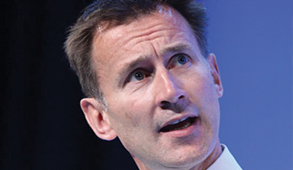Cuts must not affect health and care
 Despite the resignation of Liz Truss this week, Mr Hunt (pictured) said he intends to remain chancellor and deliver his next financial statement, due on 31 October. By that time a new prime minister should be in place, and ultimately the choice of chancellor and the timing of the statement will be in the new prime minister's gift.
Despite the resignation of Liz Truss this week, Mr Hunt (pictured) said he intends to remain chancellor and deliver his next financial statement, due on 31 October. By that time a new prime minister should be in place, and ultimately the choice of chancellor and the timing of the statement will be in the new prime minister's gift.
In his first intervention since being appointed chancellor on 14 October, Mr Hunt – a former health secretary and immediate past chair of the Commons health and social care committee – abandoned most of his predecessor’s mini-Budget. This included plans to cut the basic rate of income tax by 1% and changes to IR35 (off-payroll) rules.
Despite these measures, he said ‘difficult decisions on tax and spending’ had to be taken to restore financial stability to the country. ‘All departments will need to redouble their efforts to find savings, and some areas of spending will need to be cut,’ he added.
Saffron Cordery, interim chief executive of NHS Providers, said trust leaders acknowledged the needs for economic confidence and stability. But Mr Hunt knew the pressures on the NHS better than many.
‘Budgets are already cut to the bone with a pressing shortage of capital investment to ensure buildings are safe and effective. Trust leaders have to make tough choices every day due to soaring inflation and high energy bills.
‘Nationally, NHS budgets are also under pressure due to inflation, the cost of NHS staff pay awards not fully funded by the government and less financial support to cope with the impact of Covid-19.’
She added that the service was already struggling with stretching efficiency targets.
‘Having to hunt for yet more savings will be extremely hard to do and can only impact on patient care. It’s vital that capital budgets aren’t raided to fund day-to-day spending.’
Investment in growth
The NHS Confederation urged the chancellor to view every pound spent on healthcare as an investment in economic growth rather than a cost to the economy.
The confederation commissioned independent analysis, which it said proved, for the first time, the direct correlation between increased investment in the NHS and growth in the economy.
The analysis found that for every pound spent on the NHS, £4 is recouped through productivity gains and increased participation in the labour market. Further investment in the health service would reduce A&E attendances and those reporting long-term sickness – both associated with reductions in unemployment. This was especially true in deprived areas with high levels of unemployment.
The NHS could also directly contribute to economic growth as the largest employer in the country, the report suggests. The confederation added that the impact could be greater if the service was funded to fill its current 132,000 vacancies, allowing it to deliver more activity to reduce waiting lists and return more people to the labour market.
According to the Office for National Statistics, the proportion of people aged between 16 and 64 not looking for work was 21.7% in the period June to August, with the number of long-term sick standing at a record 2.5 million. The analysis suggested that a 1% decrease in general morbidity, measured as the proportion of those not working due to long-term sickness, would increase the employment rate by 0.45% or an extra 180,000 workers
 Confederation chief executive Matthew Taylor (pictured) insisted that ‘spending on the NHS should be regarded as an investment, not a cost’.
Confederation chief executive Matthew Taylor (pictured) insisted that ‘spending on the NHS should be regarded as an investment, not a cost’.
He continued: ‘This will require investment in the NHS to reduce the number of people languishing on waiting lists or experiencing other conditions that mean they can’t work. This analysis debunks the myth that the NHS is a drain on public resources – in fact, it’s a key driver of labour productivity and wider economic activity.
‘And as one of the largest employers across the country, the NHS often not only provides the main source of employment in many areas, but it also acts as a lifeline for local businesses.’
He urged Mr Jeremy Hunt –– not to forget the need for investment in the NHS. This would give the UK economy a significant boost at a time of skills shortages and rising cost of living.
Related content
The value masterclass shares examples of organisations and systems that have pursued a value-driven approach and the results they have achieved.
This webinar series offers colleagues of ICS organisations the opportunity to discuss common priorities, challenges, and successes within their field.